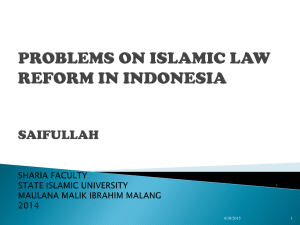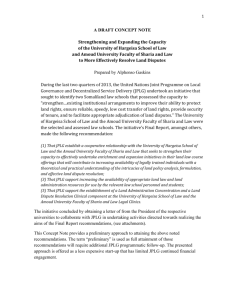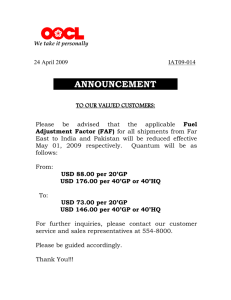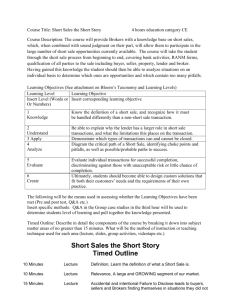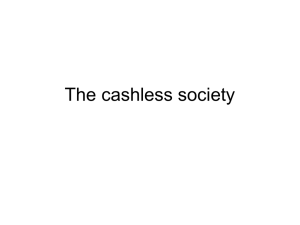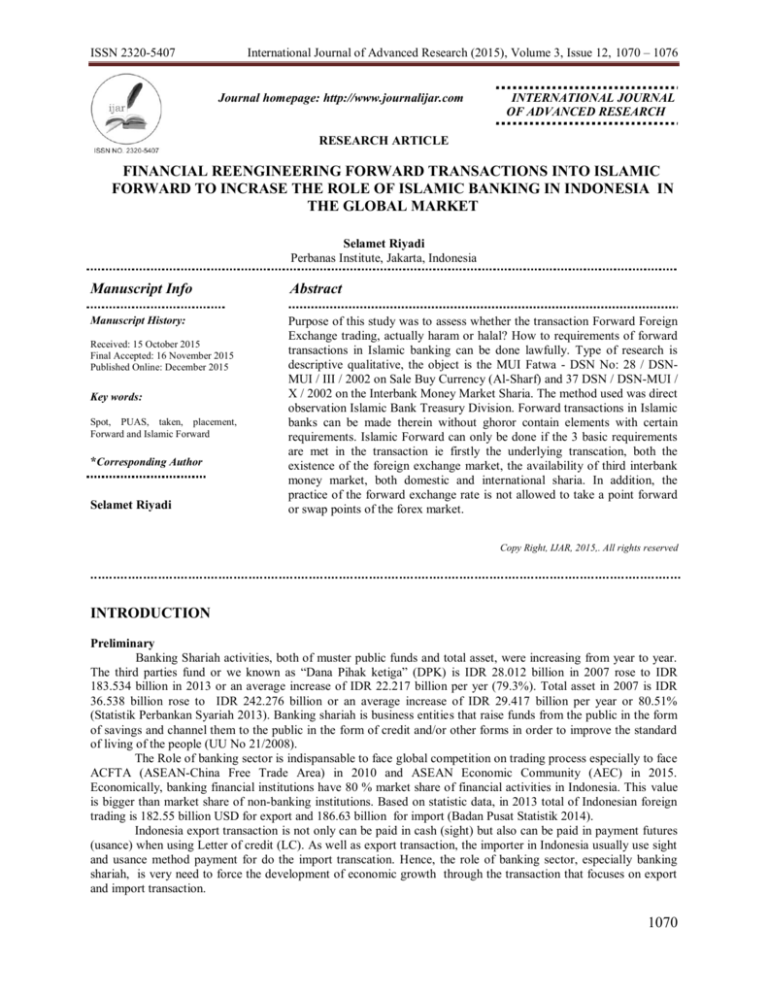
International Journal of Advanced Research (2015), Volume 3, Issue 12, 1070 – 1076
ISSN 2320-5407
Journal homepage: http://www.journalijar.com
INTERNATIONAL JOURNAL
OF ADVANCED RESEARCH
RESEARCH ARTICLE
FINANCIAL REENGINEERING FORWARD TRANSACTIONS INTO ISLAMIC
FORWARD TO INCRASE THE ROLE OF ISLAMIC BANKING IN INDONESIA IN
THE GLOBAL MARKET
Selamet Riyadi
Perbanas Institute, Jakarta, Indonesia
Manuscript Info
Abstract
Manuscript History:
Purpose of this study was to assess whether the transaction Forward Foreign
Exchange trading, actually haram or halal? How to requirements of forward
transactions in Islamic banking can be done lawfully. Type of research is
descriptive qualitative, the object is the MUI Fatwa - DSN No: 28 / DSNMUI / III / 2002 on Sale Buy Currency (Al-Sharf) and 37 DSN / DSN-MUI /
X / 2002 on the Interbank Money Market Sharia. The method used was direct
observation Islamic Bank Treasury Division. Forward transactions in Islamic
banks can be made therein without ghoror contain elements with certain
requirements. Islamic Forward can only be done if the 3 basic requirements
are met in the transaction ie firstly the underlying transcation, both the
existence of the foreign exchange market, the availability of third interbank
money market, both domestic and international sharia. In addition, the
practice of the forward exchange rate is not allowed to take a point forward
or swap points of the forex market.
Received: 15 October 2015
Final Accepted: 16 November 2015
Published Online: December 2015
Key words:
Spot, PUAS, taken, placement,
Forward and Islamic Forward
*Corresponding Author
Selamet Riyadi
Copy Right, IJAR, 2015,. All rights reserved
INTRODUCTION
Preliminary
Banking Shariah activities, both of muster public funds and total asset, were increasing from year to year.
The third parties fund or we known as “Dana Pihak ketiga” (DPK) is IDR 28.012 billion in 2007 rose to IDR
183.534 billion in 2013 or an average increase of IDR 22.217 billion per yer (79.3%). Total asset in 2007 is IDR
36.538 billion rose to IDR 242.276 billion or an average increase of IDR 29.417 billion per year or 80.51%
(Statistik Perbankan Syariah 2013). Banking shariah is business entities that raise funds from the public in the form
of savings and channel them to the public in the form of credit and/or other forms in order to improve the standard
of living of the people (UU No 21/2008).
The Role of banking sector is indispansable to face global competition on trading process especially to face
ACFTA (ASEAN-China Free Trade Area) in 2010 and ASEAN Economic Community (AEC) in 2015.
Economically, banking financial institutions have 80 % market share of financial activities in Indonesia. This value
is bigger than market share of non-banking institutions. Based on statistic data, in 2013 total of Indonesian foreign
trading is 182.55 billion USD for export and 186.63 billion for import (Badan Pusat Statistik 2014).
Indonesia export transaction is not only can be paid in cash (sight) but also can be paid in payment futures
(usance) when using Letter of credit (LC). As well as export transaction, the importer in Indonesia usually use sight
and usance method payment for do the import transcation. Hence, the role of banking sector, especially banking
shariah, is very need to force the development of economic growth through the transaction that focuses on export
and import transaction.
1070
ISSN 2320-5407
International Journal of Advanced Research (2015), Volume 3, Issue 12, 1070 – 1076
Islamic Bank can conduct spot transaction to meet its liquidity needs, but in this case they cannot use
forward transaction. The payment in spot transaction is usually use global currency like American dollar (USD),
poundserling (GBP), euro (EUR), and singapore dollar (SGD). Spot transaction can be defiened as a transacion of
sales and purchases foreign exchange that can do on that time (over counter) or must delivery within two working
days after the transaction date (riyadi 2006). The legal of spot transaction is permissible, because its is cash while
two working days for settlement process cannot be avoid. Spot transaction is also international transaction. Based on
fatwa MUI, Islamic bank of Indonesia can do sales and purchases foreign exchange.
Asside from spot transaction, the legal of forward transaction is not permissable or haram. Actually forward
transaction can be defined as a purchase agreement with a certain price and delivery of “buarannya” can be done in
the future (Malkawi 2014). Forward transaction can also defined as sales and purchases foreign exchange that is the
value wass determined at the time and will be apllied fo the future, between more than two working days up to one
year. Forward market is a transaction for the future while determination of the currency will be performed at the
time of signing contract (Koch 2006). Forward transaction is not allow to do because the price that was used is the
agreement price (muwa’adah) and the delivery will be be done in the future, while the price at the delivery time will
not same with the agreement price. Except for transactions was did in forward agreement for needs that can not be
avoided (Lil hajah)
The Interbank money market that is forbidden by sharia is the interbank money market based on interest.
The righteous one is the interbank money market based on profit sharing (DSN Fatwa 37/DSN-MUI/X/2002). Based
on the existing fatwa and the transaction executed by sharia bank treasury division, this research conducts
assessment and analysis for the possibility of sharia forward transaction ran by Indonesia Sharia Banking.
Parties do export and import transaction want certainty. Exportir wants payment certainty, while importer
wants the goods he or she buy is suitable with the order he or she issued in the right time. In order to do those certain
transactions, bank role is needed as a party which issues LC as importer preferred. Letter of Credit or credit (UCP
article 2) means promise, as explained, irrevocable (can not be nulled by one party) and therefore it is a sure
commitment from issuing bank for comply documents presentation. Issuing bank has obligation to pay the LC
issued as long as the documents required are presented comply with the LC requirement. On the other hand, if the
documents presented are not comply, the issuing bank shall have not any obligation to pay the LC issued.
Every person or company can do import transaction, the transaction which carry goods from outside
Indonesia Custom Area into Indonesia Custom Area, while export is the other way around (Riyadi & Hadiyati,
2012). Export- import transactions help sustainability and growth of a country. These two transactions usually use
LC and can be funded by sharia bank as stated in DSN Fatwa DSN No.34/DSN-MUI/IX/2002 and No.35/DSNMUI/IX/2002, after fulfill certain requirements (Karim, 2007)
In running the transactions, sharia bank is forbidden to do transactions that have gharar, maysir, and usury
element. Gharar is a transaction that has obscurity from one party. Maysir is every speculative action in order to get
profit (Rivai, 2008). Usury is every excess that comes up from buying and selling, or borrowing and lending that the
payment is over the loan principal (Rivai, 2008)
Hence, the breakthrough mechanism is needed in order to meet customer need in using usance LC with
halal forward term to finance the usance instrument.
Methodology
This research was used descriptive qualitative method. The aims of descriptive analysis are to know the
characteristics of the variable’s research so the research can have an ability to describe characteristic of the situation
and description about every aspect that relevant to the phenomena of forward transaction in Islam Bank. The
contains of descriptive analysis are notes that describe the real situation that will support this study. The procedure
to solve the problems was anlyzed by using data and facts finding in this research object. Science research can be
done for the implementation study (Ferdinand 2014). besides to give new contribution in science development, The
result of this study more focus on problem solving that faced by Islam bank’s management when they do forward
transaction with their customer.
Literatur Review
Forward contracts(Rose and Hudgins : 2013), agreements that can be used when customer anticipates a future need
to acquire foreign currency or expects to receive foreign currency, fixing the price at which currency is exchanged
and specifying a date on which currency will be delivered.
Letter of Credit
1071
ISSN 2320-5407
International Journal of Advanced Research (2015), Volume 3, Issue 12, 1070 – 1076
Letters of credit is arrangements that whereby a bank at the request of the purchaser permitted the another
bank if during a certain period to the seller, the buyer order goods transport document in accordance with conditions
stipulated in credit give to the bank, maximum amount of credit to pay or promise to pay and then mentioned letters
send to transfer to the buyer for ordering bank (Rezaei, 2010). Letter of credit is a commitment by a bank or any
other person at the request of orders, based on as issuer, bills or other interest claim to the conditions Adapt them
with stipulated conditions in credit (Amrovani, 2008).
Export letter of credit opened by the buyer in favor of seller. Letter of credit is caused that risk related to buyer
credit be transferred to the issuer bank letter of credit. Except cash, letters of credit creates the seller maximum
protection (Katyvra & et al, 2007).
The Role of Letter of Credit in International Trade
Sales of goods and services to foreign buyers have more and more diverse risks that emerge for trading in
the domestic market. Conflicts of interest and unfamiliarity and ensure buyer and seller together is caused that
creating mechanism called letter of credit that consider interests of both buyer and seller and partly balance the risks
of contracting parties, so that provide documentation carrying goods to a third institution (bank) was considered
indicative of delivery of goods and according to it the payment done through bank (Rezaei Barzegar, 2010). Letter
of credit payment mechanism is such as blood flow in body of international transactions. Letter of Credit, due to the
need to have vital importance in international transactions is independent of the mother or the original transaction of
purchase and sale and subsequently specific problems separately from it (Ebaft, 2007).
Nowadays banks play a crucial role in facilitating domestic and international business exchanges and
transactions. Especially in arena of international trade that without the involvement and assistance of banks, the
transaction like international trade and many more can come into reality because invention and use various tools of
bank such as letter of credit and bank guarantees solved many of the problems caused by distance and direct contact
between international traders, while maintain two major characteristics of businesses means the speed and accuracy
(Jay & Cole, 1980).
Types of Letter of Credit:
Import/Export Letter of Credit :The same credit is termed as Import Letter of Credit or
Export Letter of Credit. It depends on whose perspective it is being considered. For the
importer it is termed as Import Letter of Credit and for the exporter it is termed Export Letter
of Credit.
Revolving Letter of Credit (L/C): Revolving letters of credit were a tool created to allow
companies conducting regular business to issue a letter of credit that could “roll-over”
without the company having to reapply, thus enabling business flow to continue without
interruption as long as the terms and conditions, quantities, and other transaction details did
not change.
Revocable Letter of Credit: Without the authentication of the seller/exporter (beneficiary),
buyer/importer (applicant) can cancel or make any amendment of this type of Letter of Credit
through the issuing Bank. This type of letter of credit is totally manipulated by the buyer.
None accepts this type of letter of credit these days.
Irrevocable Letter of Credit: Without the authentication of the seller/exporter (beneficiary),
buyer/importer (applicant) cannot cancel or make any amendment of this type of Letter of
Credit through the issuing Bank. It can only be cancelled without the authentication of the
seller/exporter (beneficiary) if it is expired. Exporters always prefer this type of letter of
credit.
Transferable Letter of Credit : Transferable Letter of Credit is required when the exporter
is middleman or agent (not the actual supplier) of the goods but buyer finds it valuable to
work with this type of agent/middleman. This is also fact that sometimes agent/middleman
does not want the buyer and supplier knows each other. In this type of Credit, the exporter
has the right to transfer the credit to one or more subsequent beneficiaries to procure the
goods and arrange them to be sent to the buyer. Usually buying houses prefer this type of
letter of credit.
Nontransferable Letter of Credit: The credit cannot be transferred to anyone by the
exporter/beneficiary.
Confirmed Letter of Credit: An additional confirmation or guarantee that commits to
payment of the letter of credit. A confirmed letter of credit is typically used when the issuing
1072
ISSN 2320-5407
International Journal of Advanced Research (2015), Volume 3, Issue 12, 1070 – 1076
bank of the letter of credit may have questionable creditworthiness and the seller seeks to get
a second guarantee to assure payment.
Unconfirmed Letter of Credit: This type of letter of credit, does not acquire the other
bank's confirmation.
Sight Credit and Usance Credit (L/C): Sight credit states that the payments would be made
by the issuing bank at sight, on demand or on presentation. In case of usance credit, as per
agreement by both of the exporter/beneficiary and importer/applicant this type of letter of
credit requires an indicated duration for payment instead of getting paid immediately after
the valid documents are checked. By this time importer/buyer can take the opportunity to
arrange money selling the goods.
At Sight Letter of Credit: As mentioned in this type of letter of credit, payment is made to
the exporter/beneficiary immediately upon presentation of the correct document. Apparel
exporter prefers this type of letter of credit.
Red Clause Letter of Credit: This is the specific type of letter of credit that carries a
provision (traditionally written or typed in red ink) which allows a exporter/beneficiary to
draw up to a fixed sum from the advising or paying-bank, in advance of the shipment or
before presenting the prescribed documents.
Back to Back Letter of Credit : The Back to Back Letter of Credit (sometimes referred to
as the Baby or Slave Letter of Credit) is issued on the strength of the Master Letter of Credit
(Master LC). Back to Back Letter of Credit is issued by the exporter’s bank (advising bank)
to the supplier to procure raw materials. Permission of the ultimate buyer or that of the
issuing bank is not required to issue a back to back letter of credit
Description and Result
As any other general bank, sharia bank must preserve good liquidity. It must be done so that sharia bank
can always fulfill its customer demands who wants to withdraw his/her money, in cash or interbank transfer on
various currency. This condition makes sharia bank must maintain enough cash or fund all the time, nor excessive or
short. If short condition happens, it will have negative impact for sharia bank, as well as excess condition which
cause idle fund condition that indirectly reduce profit sharing result that is accepted by depositor of sharia bank.
To avoid those negative conditions, Indonesia sharia bank must run its activity through forex market,
trading or exchanging foreign currency, and Sharia Interbank Money Market (PUAS). Customer needs in buying
main currency such as USD, GBP, EUR is caused by the exixtance of international trade. International banks offer
foreign currency to the customers to fulfill their need to pay import goods like raw materials (Rose, 2013). The
transactions which are done by importer or exporter can be carried out sight or usance depends on buyer and seller
agreement in sales contract.
Sharia bank forex market can be ran with any bank any time, whether it is in Jakarta with all local banks or
abroad correspondent bank, such as Singapore, Hongkong, Japan, USA, Australia, and England as long as the forex
and money market lines in each banks have connected and are ready to be used. However, borrowing and lending
transactions can only be done to other sharia bank in Indonesia through Sharia Interbank Money Market (PUAS).
The borrowing and lending with abroad correspondent can only carried out bilaterally between two banks only
based on agency arrangement which was agreed before.
Practically, every customer who has deposit in sharia bank, in current account, or saving account, and or
time deposit, whether in withdrawal or placement does not have to use same currency. Customers are free to use a
currency suitable with their need. Customers who have current account in USD when make placement can put their
money in IDR using offer currency that is stipulated by sharia bank, vice versa in the event of the customer has IDR
account and make deposit in USD.
In the condition that a customer makes deposit in big amount, that automatically this fund can be used for
finance the debtor of sharia bank, and since to process and analyze the loan proposal take quite long time, especially
for big amount of business need, on the other hand, the depositor surely prefers high profit sharing . Therefore, in
order to avoid idle fund, while waiting the loan approval, sharia bank can use the fund in PUAS or buy Indonesia
Sharia Bank Certificate (SBIS), so that the fund can be used productively
Thereby, in the event of big withdrawal for certain currency, such as USD, while his/her account is in IDR,
meanwhile, cash and current account on The Central Bank (nostro) is not sufficient to fulfill customer needs,
therefore, the first option that can be done by sharia bank is to buy USD from other bank. Second option is to
borrow from PUAS domestic and abroad. If sharia bank buy USD from other banks, it will use offer quoting
1073
International Journal of Advanced Research (2015), Volume 3, Issue 12, 1070 – 1076
ISSN 2320-5407
currency from the seller. On the other hand, borrowing from other banks will be worn lender margin offer from the
lender. These two transactions, buying-selling USD and or borrowing- lending USD can be done simultaneously by
every foreign exchange sharia bank. This condition only can be owned by sharia bank that had done an agency
arrangement signing, which contained right and obligation of both parties, long before the transaction emerges. For
exporter or importer customer of a bank that does not have agency arrangement like sharia bank, in such event, the
borrowing-lending process, and forex trading will take long time.
Forward transaction that carries out by general banking now a days is forward currency stipulation which is
done today for buying or selling USD to IDR a month or three month in the future with spot currency USD/IDR for
example 11.500-11.600 adding forward/swap point from forex market, for instance a month 125-350 point, three
month 145-175 point. If an importer opens an usance LC for USD 1 million, the currency given is:
IDR. 11.600 + IDR. 175 = IDR. 11.775
The amount of money which customer must prepare for due date (three month later) to settle USD 1 million is:
USD. 1.000.000 x IDR. 11.775 = IDR. 11.775.000.000
This forward transaction is forbidden by National Sharia Board (DSN) since has maysir, ghoror, and usury elements.
Based on illustrations above and considering forward transaction practice nowadays, Indonesia Sharia Bank
has chance to do sharia forward transaction as follow:
1. Exporter and importer customer has an export or import transaction with his/her partner abroad using
usance LC. When submits opening usance LC application, the customer can be given a facility to buy USD
forward, for instance, USD to IDR, or if customer has usance export draft based on LC to abroad bank,
forward facility to sell also can be given for the customer. Based on previous state condition, sharia bank
customer who does usance export or import has certainty to get future following months currency value, so
that it can push sharia banking growth in Indonesia to compete globally.
2.
Based on customer need whom does import using three month usance LC, sharia bank can directly provide
USD on the same day the importer does forward transaction with sharia bank. In order to get USD needed,
for example USD 1 million, sharia bank can borrow IDR from Sharia Interbank Money Market (PUAS) for
certain forward time that customer does. The amount of debt that sharia bank taken is equivalent USD 1
million. Therefore, if that day currency stipulated at USD/IDR 11.600 – 11.700, in order to get USD 1
million, sharia bank need IDR as follow:
USD 1,000,000 X IDR 11.700 = IDR. 11.700.000.000.
In order to have nominal amount of loan of IDR.11.700.000.000, sharia taken bank has to pay profit
sharing, for example equivalent 9 %. The USD 1 million that will be handed over after forward contract in
other sharia bank reaches its due date and get profit sharing, for example equivalent 2 %. Therefore, the
profit sharing gap which is paid to lender bank and will be received from taken bank:
9% - 2% = 7%
Based on this payment and reception gap, sharia bank calculate IDR value in forward period of time as
follow:
IDR.11.700 7% 90
IDR. 204,75
360
The amount which is used to define three month forward exchange rate is:
IDR. 11.700 + IDR. 204,75 = IDR. 11.904,75
Therefore, forward exchange rate given for a customer who opens import three month usance LC is
USD/IDR. 11.904,75 for USD. 1,000,000
The transaction mechanism which is done by sharia bank is as follow on picture 1:
Picture 1 Sales Contract Transaction
Importir/
Buyer/
Applicant
Sales
Contract
Exportir/
Seller/
Beneficiary
Sales contract (SC) consists of good type, quality, pricing condition such as Free On Board (FOB), Cost
and Freight (CFR), Cost Insurance and Freight, and eight more pricing conditions, terms of payments, good
1074
ISSN 2320-5407
International Journal of Advanced Research (2015), Volume 3, Issue 12, 1070 – 1076
delivery, whether by sea or air (for international trading) as pledged in incoterms 2010, published by
International Chamber of Commerce (ICC) and started to apply on January 1 st 2011.
One of the term of payments which is stated in SC is usance payment that makes an applicant or buyer pays
the good his/her purchases, for example, three month after B/L date. On the contrary, beneficiary or the
seller receives reversely. Based on that transaction, applicant will contact his/her bank (issuing bank) to buy
foreign exchange, for example, USD. 1.000.000 (as LC value) that has three month future term.
Based on transaction with applicant, issuing bank will contact its correspondence bank to do
transaction in Sharia Money Market Interbank (PUAS) and in the same time do spot trading with other
banks and forward with Applicant, forward transaction that is done by the applicant after receives the bill
and accepts defining due date of usance import draft settlement is as shown on following picture:
Picture 2 Forward Transaction Mechanism through PUAS and Forex Market
Buy Forward
Applicant
(Importir)
Sharia Bank
(Issuing Bank)
Borrow IDR
Buy Spot USD
PUAS
(MM Interbank
Syariah)
FX Market
(Foreign Trading
Currency)
3 Month Forward
Currency Quotation
Summary
The Growth of international export import trading has increased steadily over the year, plus the enactment
of massive ASEAN-China (ASEAN – China Free Trade Area/ ACFTA) trading in 2010 and Asean Economic
Society (MEA) in 2015, banking which has 80 persen of market share in financial sector Indonesia is demanded to
always innovate in its product development, especially in forex trading. Indonesia foreign trading data in 2013
shows that year export on USD 182,55 billion and import on USD 186,63 billion (BPS,2014). Not only export and
or import transaction done in sight, but also in usance, using LC the bill will be provided in export usance draft. In
order to smoothen the process banking role is really needed. Sharia banks hold important role to boost economic
growth through international trade
Islamic forward can only carried out as long as fulfilled three basic requirements in the transaction: first,
there is underlying transaction using usance trading term, second, there is forex market that carries out local (idr)
trading with foreign exchange in interbank domestic or abroad, third, sharia interbank money market is established
for domestic and international. Moreover, in determine forward currency, it is not allowed to take forward point or
swap point from money market since it will cause speculative transaction (maysir) that is forbidden. Hence, with
sharia forward that emphasizes on the calculation based on underlying transaction, the forbidden transactional can
be avoided.
1075
ISSN 2320-5407
International Journal of Advanced Research (2015), Volume 3, Issue 12, 1070 – 1076
Moreover, if forward sharia can be carried out, it will open new opportunity for sharia banking to grow its
business especially in international trading, export import which is done in usance term. Thus, it will also give
opportunity for the entrepreneur who wants to use sharia banking holistically
Bibliography
Bank Indonesia. 2013. Statistik Perbankan Syariah Indonesia tahun 2013.
Biro Pusat Statistik. 2014. Volume Impor dan Ekspor dalam USD.
Dewan Syariah Nasional. 2002. Fatwa No.28/DSN-MUI/III/2002 tentang Jual Beli Mata Uang (Al-Sharf)
Dewan Syariah Nasional. 2002. Fatwa No.34/DSN-MUI/IX/2002 tentang Letter of Credit (L/C) Impor Syari’ah
Dewan Syariah Nasional. 2002. Fatwa No.35/DSN-MUI/IX/2002 tentang Letter of Credit (L/C) Ekspor Syari’ah
Dewan Syariah Nasional. 2002. Fatwa No.37/DSN-MUI/X/2002 tentang Pasar Uang Antar Bank Syari’ah (PUAS)
International Chamber of Commerce (ICC). 2007. ICC Uniform Customs and Practice for Documentary Credit, ICC
Publication No. 600.
International Chamber of Commerce (ICC). 2010. International Commercial Terms (Incoterms)
Ferdinand, Augusty. 2014. Metode Penelitian Manajemen, Pedoman Penelitian Untuk Penulisan Skripsi, Tesis dan
Disertasi Ilmu Manajemen. Edisi 5, Undip Press, Semarang.
Karim, A. Adiwarman. 2007. Bank Islam, Analisis Fiqih dan Keuangan, Edisi Ketiga, RajaGrafindo, Persada,
Jakarta.
Koch, W. Timothy & MacDonald, S. Scott. 2006. Management of Banking, Sixth Edition, Thomson, SouthWestern.
Malkawi, Bashar H. 2014. Financial Derivatives between Western Legal Tradition and Islamic Finance. Journal of
Banking Regulation, 15(3), 41–55. doi:http://dx.doi.org/10.1057/jbr.2012.18
Riyadi, Selamet. 2006. Banking Assets And Liability Management, Edisi Ketiga, Lembaga Penerbit Fakultas
Ekonomi, Universitas Indonesia.
Riyadi, Selamet & Hadiyati, Puji. 2012. Manajemen Jasa-Jasa Perbankan Dalam Dan Luar Negeri, Lembaga
Penerbit Fakultas Ekonomi, Universitas Indonesia.
Rivai, Veithzal & Veithzal, Andria Pertama. 2008. Islamic Financial Management, Teori, Konsep, dan Aplikasi
Panduan Praktis untuk Lembaga Keuangan, Nasabah, Praktisi dan Mahasiswa. Rajawali Press, Jakarta
Rose, S. Peter & Hudgins, C. Sylvia. 2013. Bank Management & Financial Services, Ninth Edition, McGraw-Hill,
International Edition.
Sekaran, Uma. 2013. Research Methode For Business: A Skill Building Approach, Sixth Edition, New York, John
Willey & Son, Inc.
Tahera, Khadiza Tul & Nasim, S.M.Kaisar 2014. Letter of Credit: Its Importance and Difficulties, Banglavision
Research Journal Vol 14, No 1 ISSN 2079-567 X
1076

